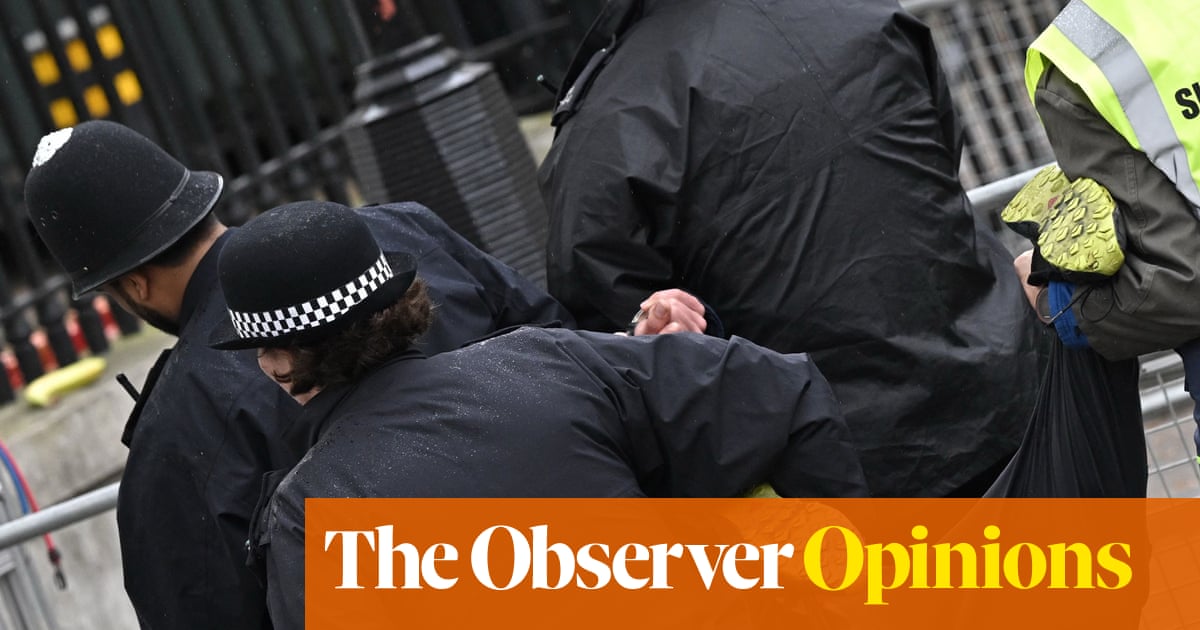
Ihesitate to give JD Vance any ideas, but if American women were denied the vote, Donald Trump would be restored to the White House in a landslide. Similarly, if men were removed from the franchise, Kamala Harris would be swept into the Oval Office in an even bigger earthquake. As it is, the two are clashing in an election marked by a gulf so wide, the phrase “gender gap” doesn’t do it justice. In ways that go deeper than mere politics, and with implications for the world beyond the US, the presidential election is increasingly looking like a war between men and women.
The numbers are stunning. An NBC poll this week found men favour Trump over Harris by 12 points, 52% to 40%. Among women, Harris leads Trump by 21 points: 58% to 37%. Put the two together and you have a gender chasm of 33 points. Men may not be from Mars and women may not be from Venus, but when it comes to choosing a US president, they are on different planets.
What explains it? The most obvious answer is that Trump’s record, including a court ruling that he had committed rape and his own admission of serial sexual assault, boasting that he grabbed women “by the pussy”, makes him repellent to tens of millions of women, none of that reduced by appointing a sidekick who speaks of “childless cat ladies”. Similar explanatory power attaches to the 2022 decision by the supreme court, in the Dobbs case, to overturn the constitutional right to an abortion. Since then, it’s been up to the 50 states whether to grant or withhold that right from women, and 22 of them have chosen to deny it. That shift is on Trump, who nominated three of the six supreme court judges who made the Dobbs decision, an achievement of which he has said he is “proud”.
But while the move delighted Trump’s evangelical Christian supporters, it has cost him dear. Dobbs did not just anger American women, it mobilised them. In the midterm elections of 2022, as high inflation fuelled disaffection with Joe Biden, Republicans assumed they would ride a “red wave” to victory. That wave never came, in part because women, furious at the court’s ruling and Republicans’ part in it, turned out in big numbers to vote against them. And while Biden has never been fully comfortable speaking about abortion, Dobbs is widely regarded as the moment Harris found her voice as a national figure.
Still, the long-running battle over abortion rights only explains one side of the gender divide. Less obvious is that, as much as women are pulling away from Trump, large numbers of men, especially young men, are drawn towards him.
Here, the numbers are even more striking. Attitude surveys show that women between the ages of 18 and 29 are the most progressive group in US history. Meanwhile, a majority of men the same age back Donald Trump. A poll of six battleground states last month found among gen Z voters a gender gulf of 51 points.
Part of it is explained by Trump’s trade in swaggering machismo, offering a kind of cartoonish manliness. In recent months that part of his act has only got louder. His supporters always wore T-shirts showing Trump’s face superimposed on a ripped, Rambo-style body, but now they have the image of his bloodied face, fist pumped in the air, seconds after the assassination attempt on him in July, as he urged his followers to “Fight, fight, fight!”
There is nothing subtle about this. At his party convention in Milwaukee he was introduced by wrestler Hulk Hogan and the man behind the Ultimate Fighting Championship. Bear in mind that one study of young people around the world found that while young women were most concerned about issues such as “sexual harassment, domestic violence, child abuse and mental health”, young men were more focused on “competition, bravery, and honour”.
In his own crude way, Trump speaks to that. I saw it for myself earlier this year in New Hampshire, where I encountered young male voters proudly declaring they were voting for “Donald J Trump”, all but saluting as they pronounced that middle initial.
The performative masculinity includes a strong element of defiance. Trump’s disregard for the norms and etiquette that govern most politicians shows a contempt for strictures that are seen as constraining men in particular. When he breaks the rules, it’s often men who cheer because they feel those rules shackle them too – and they’re sick of being told off. As one 20-year-old Trump voter complained to the New York Times, US society no longer “lets boys be boys”. As he put it: “Men my age, from a very young age we were told, ‘You’re not supposed to do this, you’re not supposed to do that, you’re just supposed to sit here and be quiet.’” Trump is anything but quiet.
Running alongside all this is the strong conviction that increased diversity and advances for women pose a threat to men. A third of men who back Trump believe that gains for women have come at men’s expense, a figure that rises to 40% among men under-50 who support the former president. This resentment surfaces in the casual misogyny that is a Trump tic, and which informs the “manosphere” that he is doing so much to cultivate: the realm of podcasters and social media influencers that delights in a blend of old school sexism and mocking humour that fits Trump perfectly.
Toxic as those voices might be, they succeed because the resentment they feed on is real. If plenty of young American men feel they’re getting left behind, that’s because on multiple key measures they are. As the scholar Richard Reeves has set out, American boys are trailing behind girls whether in readiness to start elementary school or graduation from university. Men have lost their place as the default family breadwinner, and watched as many of the jobs they once regarded as their own, including manual work requiring no degree, have vanished. When it comes to finding a partner, or even just having friends, men lag behind.
These are trends affecting all men, which might help explain why Trump has made unexpected inroads not only with non-graduate white men, but also with men of colour, especially the young in both groups. They feel beleaguered – and see in Trump someone who sees them.
Now, there’s a good chance that the gender chasm will ultimately help Harris. Women tend to vote in greater numbers than men, and they’re with her. But polls have a habit of underestimating Trump and there could be an army of young men, out of pollsters’ reach, who feel that a woman in the Oval Office would be one feminist advance too many. The Taylor Swift endorsement is welcome, but the Harris campaign could do with a thumbs-up from someone with serious influence over young men. It doesn’t help that the “who we serve” page of the Democrats’ own website features a long list of groups, including women, but makes no equivalent offer to men.
I don’t expect any of this came up when Keir Starmer met Trump this week, but there is a warning here that should sound far beyond America’s shores. As one US thinktank puts it: “History is littered with examples of nations suffering from the consequences of young men finding themselves idle without purpose.” The gender gap is becoming dangerously wide. It must not become an abyss.
Jonathan Freedland is a Guardian columnist












